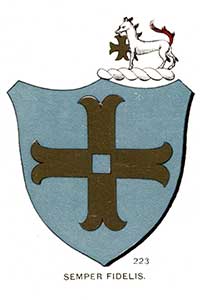The Mullineux or Molyneux Family

(Crest No. 223. Plate 15.)
THE Mullineux family is descended from Milesius, King of Spain, through the line of his son Heremon. The founder of the family was Eogan, ancestor of the Northern Hy Nials, and son of Nial of the Nine Hostages, King of Ireland, A. D. 379. The ancient name was O’Madagan, which signifies “A Field Fort.” The possessions of the sept were located in the present Counties of Donegal and Tyrone.
A celebrated man of this name was William Molyneux, the Irish patriot and philosopher. He was born in Dublin in 1656. In 1698 he published the work that has given him an enduring place in Irish history, “The Case of Ireland Stated,” in which he maintained that Ireland and England were separate and independent kingdoms, and that England possessed no right to impose legislation on Ireland without the latter’s consent. The keynote of the work was expressed in the sentence: “I have no other notion of slavery but being bound by a law to which I do not consent.” Molyneux was induced to write the work on account of the laws passed by England for the destruction of Ireland’s trade and commerce. The book created a furore; it was stigmatized as libelous and seditious by the English Parliament, and was ordered to be publicly burned by the common hangman.
He was, a friend of Locke, Borelli, the mathematician, and many other eminent personages of his day. He was the author of a number of works, mostly on philosophical subjects. With Swift he was one of the creators of the great modern weapon, Public Opinion. He died at the age of forty-two. His son, Sir Thomas Molyneux, was made a baronet in 1730, and created state physician. He was one of the most distinguished men of his time in his profession.
